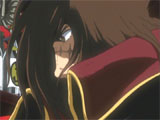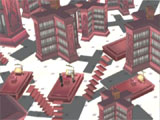

Quick Links:
Space Pirate Captain Herlock - The Endless Odyssey - Outside Legend, Volume 1: The Legend Returns
The pirate archetype in stories has always had a sort of paradoxical nature to it. The charismatic womanizing captain and his band of roughnecks sail the seas in an endless cycle of taxing rich merchants and using the bounty as backing to tax again - but, somehow, most people seem to be taken by them. (One could say the IRS has the same modus operandi, but nobody romanticizes them.) Only the merchants and governments seem to loathe and fear the pirates' existence, while for some unexplained reason, they inspire positive feelings in everyone else. Space Pirate Captain Herlock is one of these stories - with, of course, a sprinkle of impending apocalypse thrown in to identify it as Japanese. And by the way, it's great.
Captain Herlock is the type of character where you feel like you know him before he even says anything. He is an impressive character that is charismatic, and both gives and commands respect. The ship he runs (the Arcadia) is anything but tight. Anyone is welcome on the ship, and can do whatever they want when they get on board. He calls his pirate flag the flag of freedom and lives by it. Even the ship does what it wants at times. The irony of the whole thing is: the Arcadia and its crew operate like a well-oiled machine - a far cry from the type of chaotic scene one might expect. The whole show is fueled by this premise (forced order results in chaos and fear, total freedom results in order and loyalty).
The primary antagonist of the show is a supernatural being called "Noo" a manifestation of fear itself that once ruled the universe and (of course) wants to do so again. Though sealed away by an ancient power, a group of scientists came in contact with Noo's seal. Naturally, those who touched it now seek to eradicate the seal. The last living scientist, Professor Daiba, lives on a planet of garbage heaps near the edge of the Solar System, and has a son named Tadashi. Tadashi comes home one night to find that his Father's dead associates have arrived and killed him. He is saved by Herlock just as he is about to join his Father, and ends up on Arcadia with a mission for revenge.
While Herlock himself exudes charisma, the music is even more effective at hooking the viewer. Just about every trait that describes a space pirate can be found in the music, from the "iron will" of the opening theme to the sort of "nostalgic loner" theme that plays when the captain is reflecting on something. The show's visual style plugs into the mood set by the music and runs with it, creating its own charms along the way - like the virtual library that looks like something M.C. Escher would've created. Another interesting aspect of the visuals is that they're slow-paced and not the least bit flashy. (Instead of saying "Look at me!", it's more like "Look if you feel like it - I don't care".) Part of it is Leiji Matsumoto's style: characters that look like anything else you'll see but are at the same time unforgettable. The animation surprisingly features a number of old techniques as well as modern CG. Footage is reused at times, but seems to be done for effect. Macross fans should be thrilled to find that Herlock has "jet engines in space" and other classic sound effects. Perhaps even more amusing is the waving pirate flag on the Arcadia - that still waves when in space.
One of the best things about this OVA series is that it was recorded in full glorious 5.1 surround, and Geneon's release has 5.1 tracks in both Japanese and English. It sounds terrific, even cinematic. The video transfer also looks great, which is no surprise for a recent series. There is a single extra on the disc - an opening that appeared in the Japanese version but not in the Region-1 release. The packaging features Herlock standing at the helm of the Arcadia, with an expression on his face that's pretty much immutable throughout the show (with a few exceptions). And did I mention that the show's in surround sound?
This show has a little bit for everyone, though I suspect boys and men would be the ones singing its praises. Nevertheless, it's easy to recommend, and almost as easy to evangelize as one of the few must-see shows of the year. Being new to the Leiji Matsumoto universe, I can say that I've never seen anything like it. Also, I'm here to stay - until I have to go to work again.
Distributor: Geneon Creator: Leiji Matsumoto / Studio MADHOUSE Released: 2003
Video Quality: A+ Audio Quality: A+ Presentation: B+ Content: A+ Overall: A



